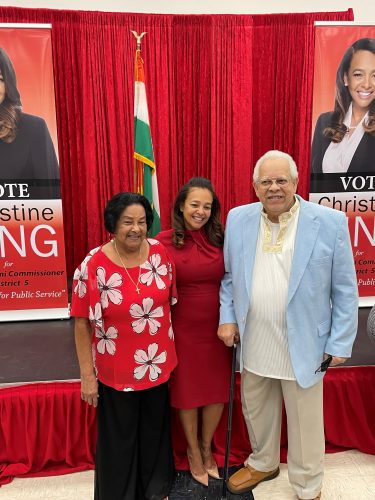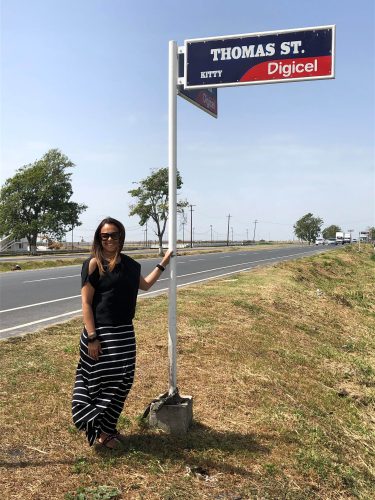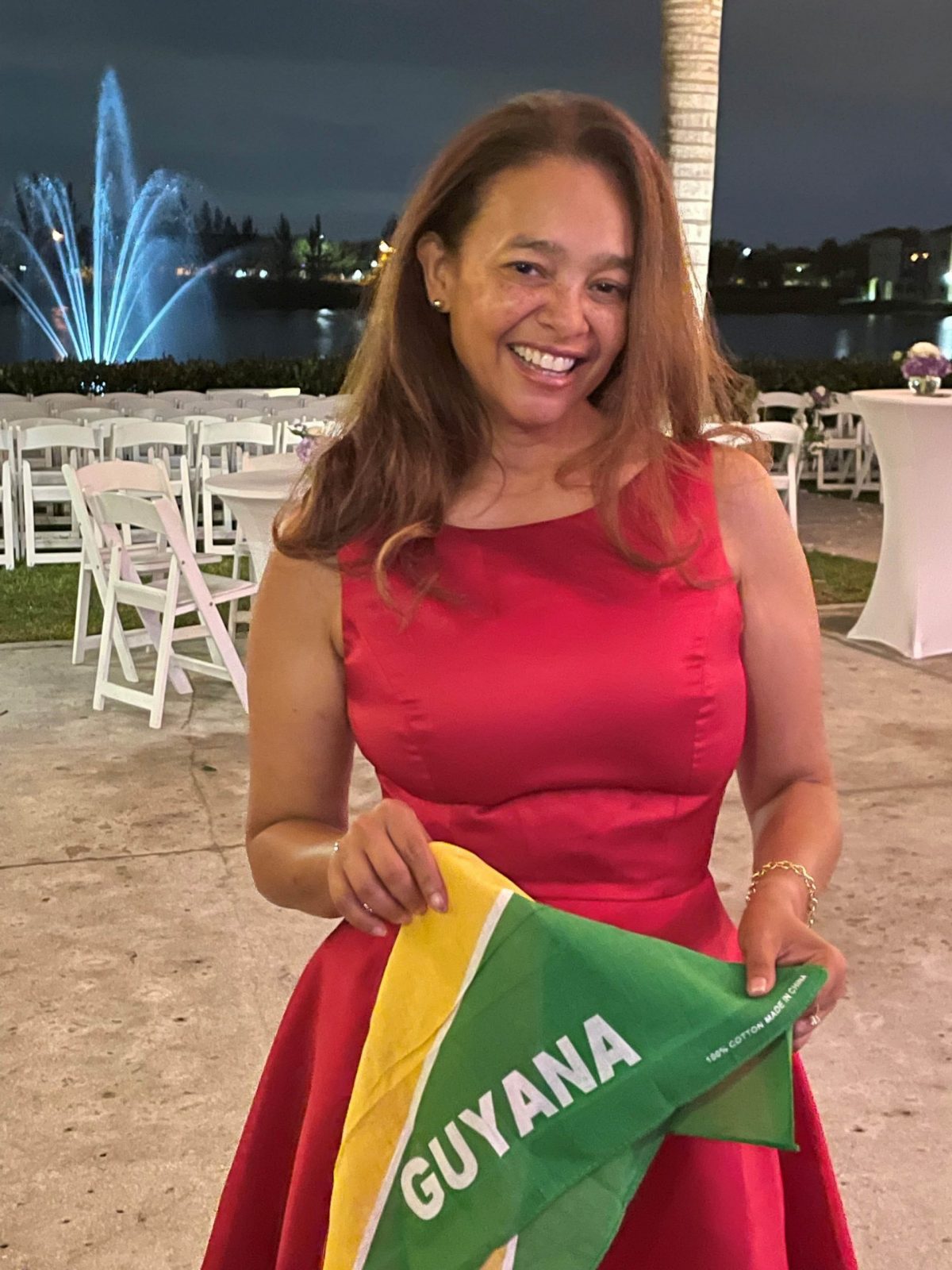What started out as a volunteer post in the office of a commissioner of the Miami-Dade County over 30 years ago, evolved into a full-time job for a young Christine King as she assisted in ensuring that the commissioner served the community that elected him. Fast forward and King, whose work throughout the years has been service oriented, was recently elected to the board and is now the first Guyanese American to be elected to the Miami Board of Commissioners in Florida, representing District 5 and currently the only woman commissioner in the city.
King’s election on November 2 also created another first as she is the only woman attorney to be elected to the board so far.
During an interview with this newspaper, the new commissioner said she ran against seven people and she gained some 65% of the votes. She said she expected to win because she did the work.

“I had a grassroot campaign. I knocked on doors for over eight months by myself. I went and I spoke to the voters. I shared my story with them and they believed in me…,” she said.
King’s term is for four years and she is allowed to vie for a second term which she has every intention of doing. She sees her current term as being “a labour of love” to the constituents.
Under her new portfolio as a commissioner, King, who has also been a practicing attorney for many years, will focus on increasing affordable and workforce housing, and reducing gun violence, in addition to addressing climate change and sea level rise. She will also look at increasing elderly and child services, and much more.
“My entire career has been of service. I started working

with Miami-Dade County with a commissioner. I was a volunteer. He had gotten elected and he made these promises to the community and I asked him well now that you are elected as commissioner what you are going to do for our community… He asked to have a meeting with me. I went and he asked in the meeting whether I would consider volunteering to help him clean up the community and I said sure…,” King told Stabroek Weekend in a recent virtual interview.
After a few months of volunteering, King was offered a full-time job and according to her, “I just fell in love with service”. She later transitioned to the community action agency department, which is a social service agency that helps low-income families to become self-sufficient among other things.
It was while she was at the county that she went to law school and later got admitted to the bar. She then resigned from that job to practice law and also became the president and chief executive officer of a non-profit corporation.
“So my entire career has been of service and in serving the community through my work with the non-profit it just kind of unfolded in such an organic natural process for me now to become a public servant, it is just what I have done in my entire career,” she said.
As commissioner, King said her service to people will be on a larger scale as she is responsible for the safety and well-being of her constituency and making sure they have access to the same benefits as the other cities in Miami.
She described her district as being unique as it has the poorest of the poor and the wealthiest of the wealthy and every-thing between and as such everyone’s needs are different. While she can be fighting for affordable housing in one part of the community, she could be battling climate and sea level rise in another part because the district is on the bay and experiences a lot of flooding.
King said she is up for the battle as she has to be an advocate for the people just as she has been for her clients over the years as losing in court was never an option.
‘Being lazy’
While King describes her journey to becoming a lawyer as her “being lazy” as she was not keen on reading for a masters and then maybe a PhD, she believes it was the best decision as being a lawyer helped her to be of service to many and opened “many, many doors” for her. “I could practice law. I could continue to work for Miami-Dade County and become a department director or the county manager or something like that with a law degree because it is so versed in what you can do,” she said.
King said she also loved to read and write and was also one who got the upper hand in an argument and so considering all of the above she decided that law matched her personality.
Importantly as well, she considered that being an attorney is also being of service because when people hire an attorney most times they are doing so at one of the scariest times of their lives and if they have a good attorney then they help to manage that emotion.
When she opened her practice, King said, she practiced what is termed as “door law” as whoever walked in became her client.
“It was just me, so you eat what you kill. You don’t have a client, you don’t eat. So I did all areas and I am also licensed in Federal Court,” she said.
But as the years went by, King said, she started to practice more family law and helped people to navigate getting a divorce or mostly single men to get visitation rights to see their children.
This was a big thing for her because in the state where she lives, according to King, fathers don’t have a lot of rights as while they have to pay child support they may not have the right to see their children.
“The state would pay for a mother to go after a father for child support but they don’t address time sharing, which is very unfair I feel. So by word of mouth, because I never advertised my practice…fathers would come to me, mothers as well,” she said.
King also dealt with landlord and tenant issues, revealing that she herself is a landlord and as president of the non-profit she also operated a business centre. In her role as landlord she needed to know about leasing and evictions. She also had clients with personal injuries’ suits.
“So it is still of service, and while practicing I did a lot of pro bono work. I helped a lot of young women who resided in public housing [with] unsafe or unsanitary housing conditions. And every single time I got involved I was able to resolve their issues, but that was pro bono work. I didn’t get paid for it,” she shared.
King said she will continue to practice law, balancing being commissioner with her practice as there is only a small salary that comes with her new position.
Guyanese roots
King said her Guyanese upbringing is the major contributing factor to the woman she is today. She was born in Kitty and migrated to the US at a very young age but her mom, Zezan Beharally, who is of Awarak-Indian and East Indian descent, ensured that their upbringing was Guyanese.
“My mom raised us with a traditional Guyanese upbringing. Like we were not allowed to sleep over at anyone’s house and just things like that… I don’t necessarily refer to it as the Guyanese upbringing because it is the only upbringing I know. Family first before anything else,” she said.
She recalled that her mother was very hardworking and when she went to the US she had no family and very shortly after they moved her parents separated. She grew up with her mom and brother for some years before her sister returned from England, where she was living with their grandmother.
While her mom raised them, King said she remained very close to her father, Dr Colin Forde, who is of black and white descent, even though he had moved to New York.
Her relationship with both of her parents was and is a good one, but she shared that they did not get along too well.
“And that is probably why I went into family law as well, because I understood the dynamics of children being deprived of their divorced parents and how it affects them,” she said.
Growing up in the US, King said, curry and roti was a staple in their home and they had pepperpot at Christmas. She said they did not eat traditional American food because her mother cooked.
She shared that in 2019, she returned to Guyana with her mother and took her to Wakapau village, which is located in the Pomeroon-Supenaam Region, where they still have family. They also visited several places in Georgetown.
Her daughter came with her during that visit and she recalled how she was hooked on sorrel and mauby and even at home in America she loves those drinks instead of sodas. Her children also love curry.
She is proud of her Guyanese heritage, which was promoted during her campaign and she believes that most of those who make up the large Guyanese community in her district voted for her.
King intends to visit Guyana next year.
Speaking to young Guyanese, King encouraged them to follow their dreams and to give a little to someone who does not have, as that is how good communities are created and how one uplifts oneself.






